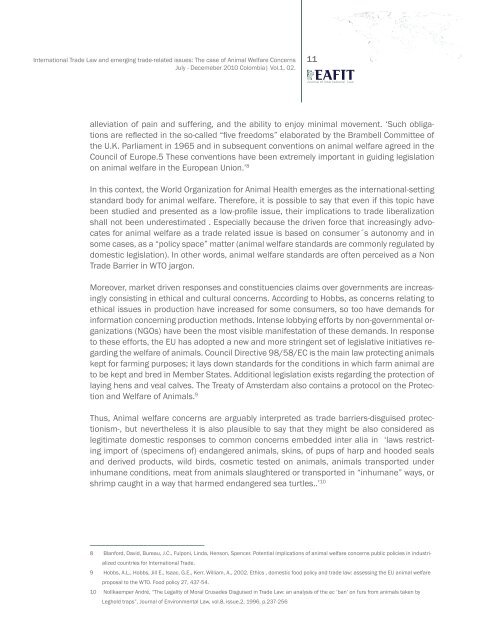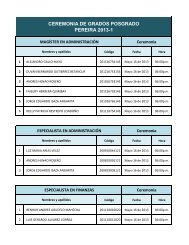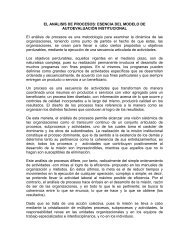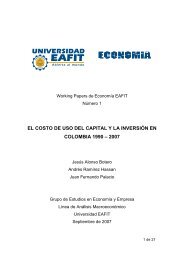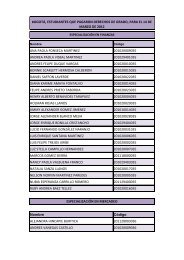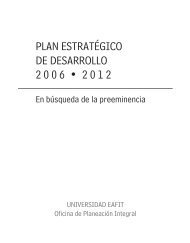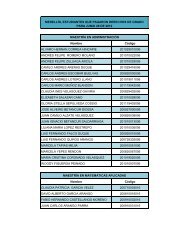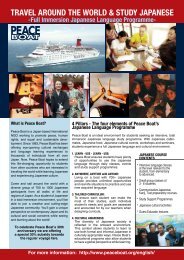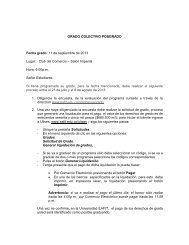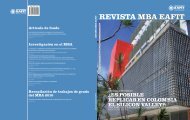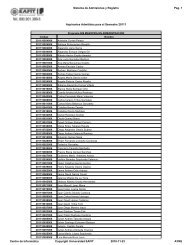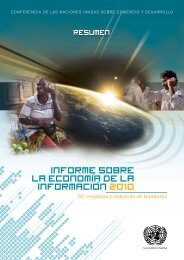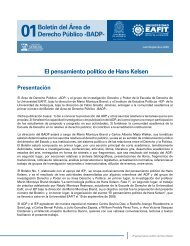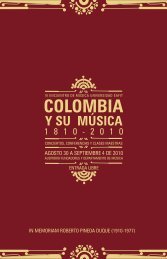International Trade Law and emerging trade-related issues:
International Trade Law and emerging trade-related issues:
International Trade Law and emerging trade-related issues:
Create successful ePaper yourself
Turn your PDF publications into a flip-book with our unique Google optimized e-Paper software.
<strong>International</strong> <strong>Trade</strong> <strong>Law</strong> <strong>and</strong> <strong>emerging</strong> <strong>trade</strong>-<strong>related</strong> <strong>issues</strong>: The case of Animal Welfare ConcernsJuly - Decemeber 2010 Colombia| Vol.1, 02.11Journal of <strong>International</strong> <strong>Law</strong>alleviation of pain <strong>and</strong> suffering, <strong>and</strong> the ability to enjoy minimal movement. ‘Such obligationsare reflected in the so-called “five freedoms” elaborated by the Brambell Committee ofthe U.K. Parliament in 1965 <strong>and</strong> in subsequent conventions on animal welfare agreed in theCouncil of Europe.5 These conventions have been extremely important in guiding legislationon animal welfare in the European Union.’ 8In this context, the World Organization for Animal Health emerges as the international-settingst<strong>and</strong>ard body for animal welfare. Therefore, it is possible to say that even if this topic havebeen studied <strong>and</strong> presented as a low-profile issue, their implications to <strong>trade</strong> liberalizationshall not been underestimated . Especially because the driven force that increasingly advocatesfor animal welfare as a <strong>trade</strong> <strong>related</strong> issue is based on consumer´s autonomy <strong>and</strong> insome cases, as a “policy space” matter (animal welfare st<strong>and</strong>ards are commonly regulated bydomestic legislation). In other words, animal welfare st<strong>and</strong>ards are often perceived as a Non<strong>Trade</strong> Barrier in WTO jargon.Moreover, market driven responses <strong>and</strong> constituencies claims over governments are increasinglyconsisting in ethical <strong>and</strong> cultural concerns. According to Hobbs, as concerns relating toethical <strong>issues</strong> in production have increased for some consumers, so too have dem<strong>and</strong>s forinformation concerning production methods. Intense lobbying efforts by non-governmental organizations(NGOs) have been the most visible manifestation of these dem<strong>and</strong>s. In responseto these efforts, the EU has adopted a new <strong>and</strong> more stringent set of legislative initiatives regardingthe welfare of animals. Council Directive 98/58/EC is the main law protecting animalskept for farming purposes; it lays down st<strong>and</strong>ards for the conditions in which farm animal areto be kept <strong>and</strong> bred in Member States. Additional legislation exists regarding the protection oflaying hens <strong>and</strong> veal calves. The Treaty of Amsterdam also contains a protocol on the Protection<strong>and</strong> Welfare of Animals. 9Thus, Animal welfare concerns are arguably interpreted as <strong>trade</strong> barriers-disguised protectionism-,but nevertheless it is also plausible to say that they might be also considered aslegitimate domestic responses to common concerns embedded inter alia in ‘laws restrictingimport of (specimens of) endangered animals, skins, of pups of harp <strong>and</strong> hooded seals<strong>and</strong> derived products, wild birds, cosmetic tested on animals, animals transported underinhumane conditions, meat from animals slaughtered or transported in “inhumane” ways, orshrimp caught in a way that harmed endangered sea turtles..’ 108 Blanford, David, Bureau, J.C., Fulponi, Linda, Henson, Spencer. Potential implications of animal welfare concerns public policies in industrializedcountries for <strong>International</strong> <strong>Trade</strong>.9 Hobbs, A.L., Hobbs, Jill E., Isaac, G.E., Kerr, William, A., 2002. Ethics , domestic food policy <strong>and</strong> <strong>trade</strong> law: assessing the EU animal welfareproposal to the WTO. Food policy 27, 437-54.10 Nollkaemper André, “The Legality of Moral Crusades Disguised in <strong>Trade</strong> <strong>Law</strong>: an analysis of the ec ‘ban’ on furs from animals taken byLeghold traps”, Journal of Environmental <strong>Law</strong>, vol.8, issue.2, 1996, p.237-256


